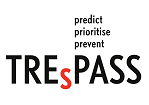Technology-supported Risk Estimation by Predictive Assessment of Socio-technical Security (TREsPASS)
Abstract
 By integrating European expertise on socio-technical security into a widely applicable and standardised framework, TREsPASS will reduce security incidents in Europe, and allow organisations and their customers to make informed decisions about security investments.
By integrating European expertise on socio-technical security into a widely applicable and standardised framework, TREsPASS will reduce security incidents in Europe, and allow organisations and their customers to make informed decisions about security investments.
Completion: 01-10-2016
Duration: 4 years
Type: EU Research Project
Website: http://www.trespass-project.eu/
Objective
Vision:
Information security threats to organisations have changed completely over the last decade, due to the complexity and dynamic nature of infrastructures and attacks. Successful attacks cost society billions a year, impacting vital services and the economy. Examples include StuxNet, using infected USB sticks to sabotage nuclear plants, and the DigiNotar attack, using fake digital certificates to spy on website traffic. New attacks cleverly exploit multiple organisational vulnerabilities, involving physical security and human behaviour. Defenders need to make rapid decisions regarding which attacks to block, as both infrastructure and attacker knowledge change rapidly. Current risk management methods provide descriptive tools for assessing threats by systematic brainstorming. Attack opportunities will be identified and prevented only if people can envisage them. In today’s dynamic attack landscape, this process is too slow and exceeds the limits of human imaginative capability. Emerging security risks demand tool support to predict, prioritise, and prevent complex attacks systematically.
The TREsPASS project will develop methods and tools to analyse and visualise information security risks in dynamic organisations, as well as possible countermeasures. An “attack navigator” will be built to identify which attack opportunities are possible and most pressing, and which countermeasures are most effective. To this end, the project combines knowledge from technical sciences (how vulnerable protocols and software are), social sciences (how likely people are to succumb to social engineering), and state-of-the-art industry processes and tools. By integrating European expertise on socio-technical security into a widely applicable and standardised framework, TREsPASS will reduce security incidents in Europe, and allow organisations and their customers to make informed decisions about security investments. This increased resilience of European businesses both large and small is vital to safeguarding the social and economic prospects of Europe.
Consortium
The TREsPASS consortium comprises the entire value chain, including academic researchers in the social and the technical sciences, researchers and practitioners from large multinational companies, and developers and practitioners from SMEs. TREsPASS is coordinated by Prof. Pieter Hartel of the University of Twente. The other partners in the project are the Technical University of Denmark, Cybernetica (Estonia), GMV Spain, GMV Portugal, Royal Holloway University of London (United Kingdom), itrust Consulting (Luxembourg), Goethe University Frankfurt (Germany), IBM Research – Zurich (Switzerland), Delft University of Technology (Netherlands), Hamburg University of Technology (Germany), the University of Luxembourg (Luxembourg), Aalborg University (Denmark), Consult Hyperion (UK), BizzDesign (Netherlands), Deloitte (Netherlands), and Lust (Netherlands).

